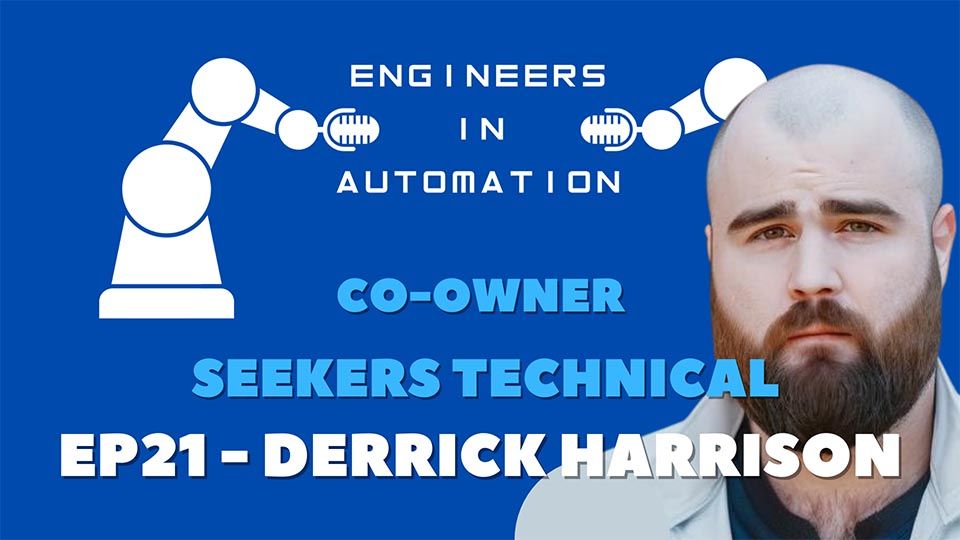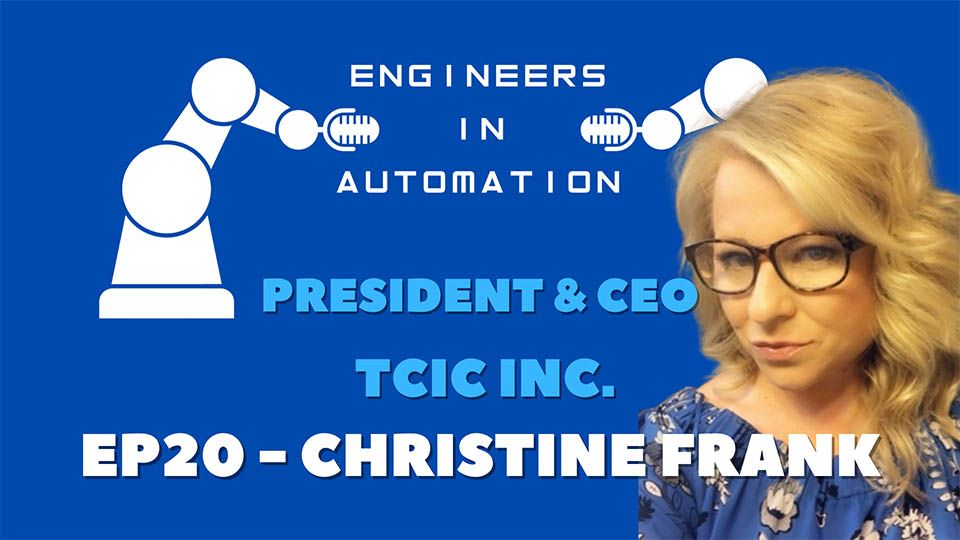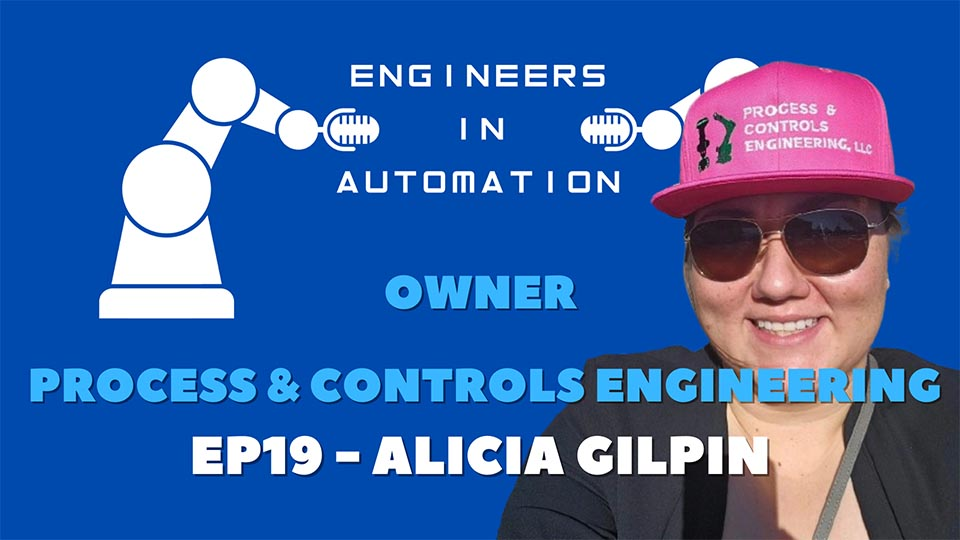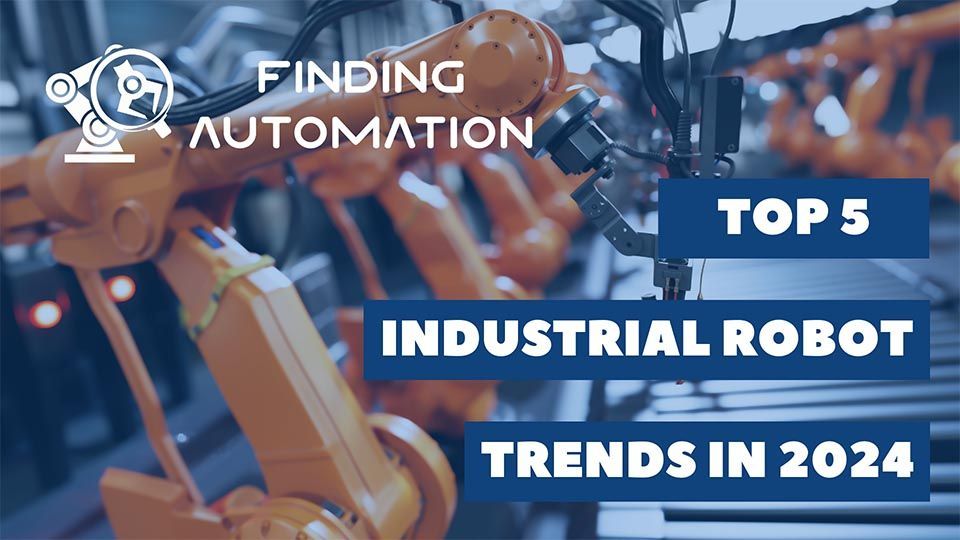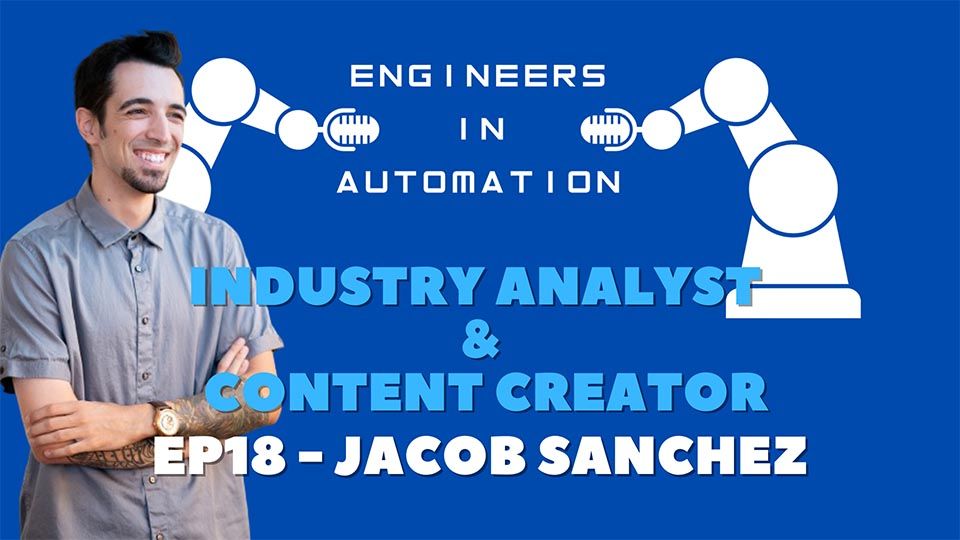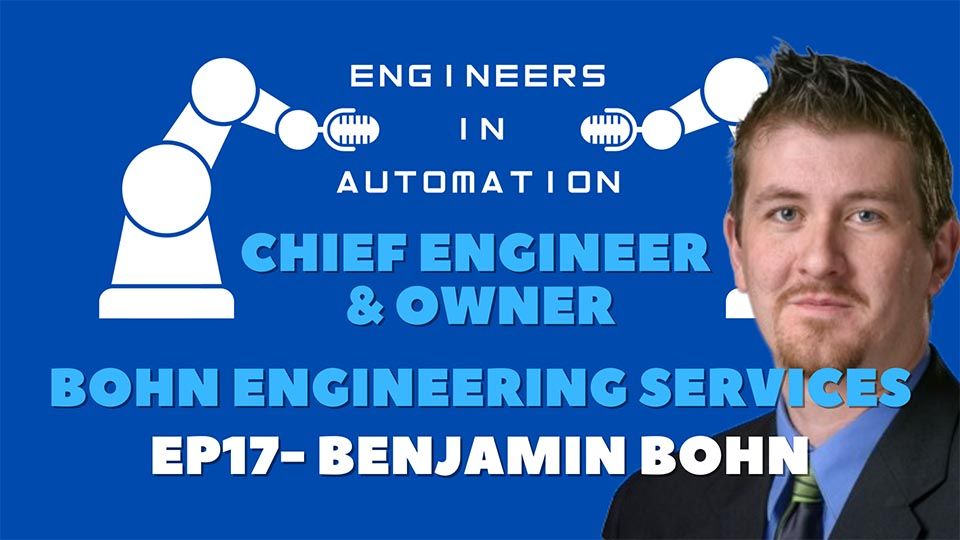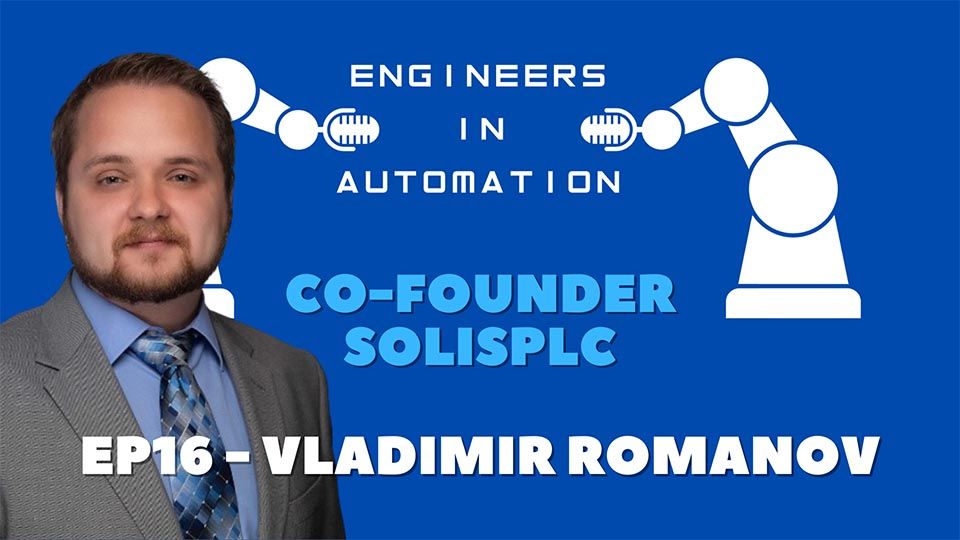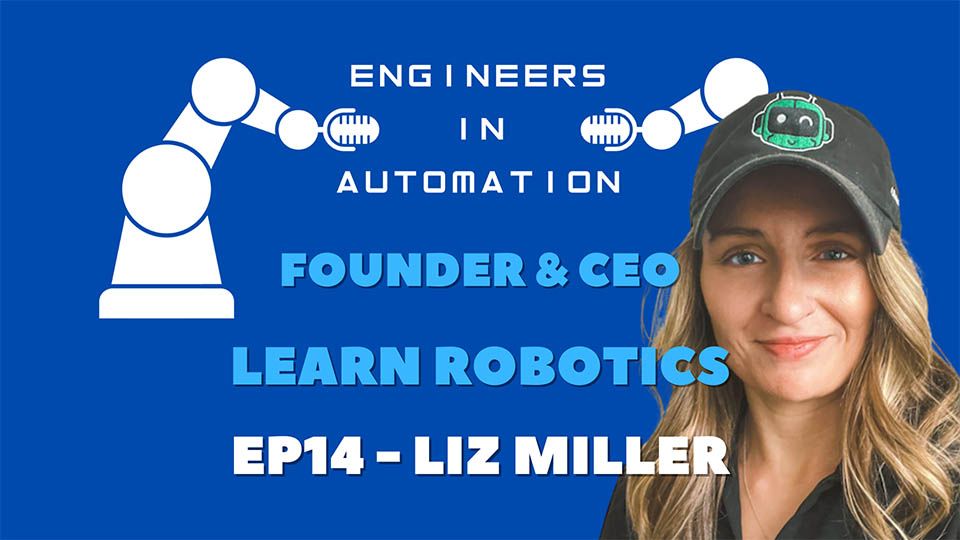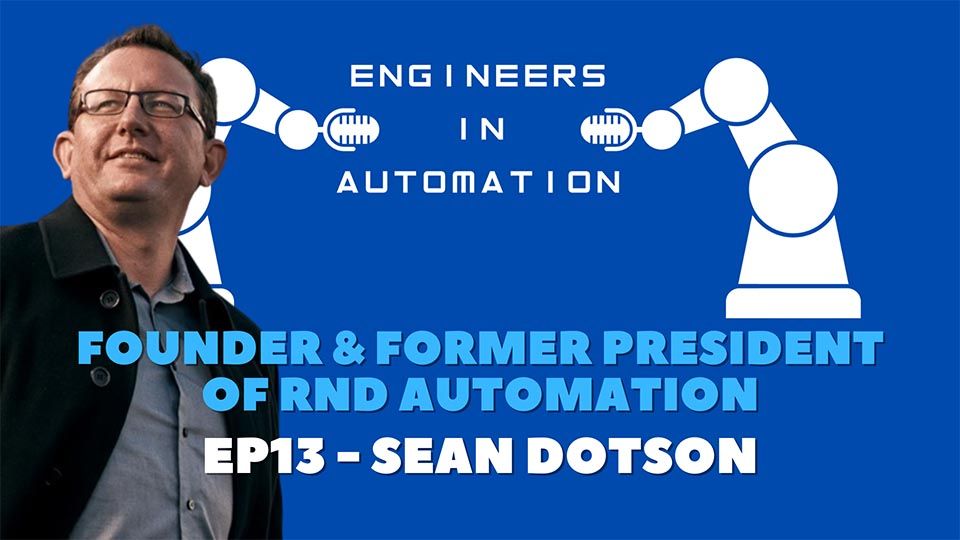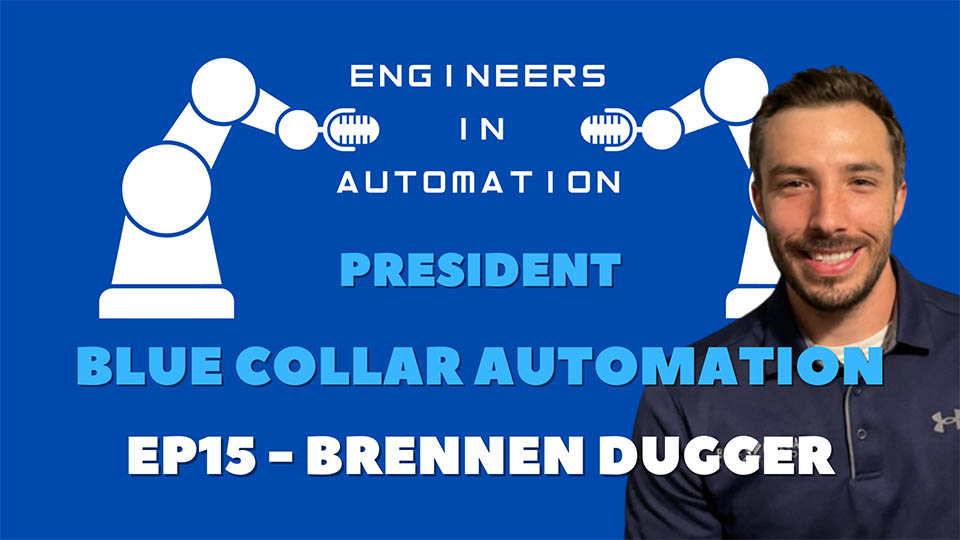Demarcus Sears | SS Automation and Controls
Engineers in Automation - Demarcus Sears | Episode 4
In this episode, we talk with the tech manager of SS Automation and Controls, Demarcus Sears. His business specializes in robotic and PLC programming. His background in automation maintenance, robot programming, weld engineering, and as a robotic engineer has led him to become an experienced automation engineer within the automotive industry. Listen to our conversation about running his own automation business.
WATCH THIS ENGINEERS IN AUTOMATION EPISODE
Keegan Dillon – Host (KD): Hi, my name is Keegan, I'm the founder of JOINER Services, and this is Engineers in Automation. On today’s episode, we are going to talk with Demarcus Sears, the tech manager for SS Automation and Controls. His company specializes in robotics, engineering, programming, as well as plc and controls engineering. Now let's go talk automation!
KD: Welcome back. I am here with Demarcus Sears, the technical manager of SS Automation and Controls. Welcome, Demarcus how are you doing?
Demarcus Sears – Guest (DS): I’m great thanks for having me.
Demarcus Sears Technical Manager:
KD: Yeah, of course! Could you give us a little bit of introduction about yourself, and who you are, and who you work with, and your company?
DS: So I am Demarcus Sears. I am a technical manager and a robotics applications engineer at SS Automation and Controls, based out of Litchfield, Tennessee, maybe 15 minutes north of Nashville. Our company provides a lot of plc and robotic support to a lot of OEMs, a lot of integrators, and we do some custom one-off applications. More specific to the automotive sector, but we're branching out, and we're trying to get into these areas that are looking to integrate uh robotics and automation to drive their throughput.
SS Automation and Controls Company Size:
KD: Yeah, great to hear. How many employees do you have at your company currently?
DS: Currently, we have three employees. We have a fourth one that's going to come on next month, and we're looking to expand if you know anybody who is looking to uh join a growing team and expand upon what they currently know, please give us a shout-out here, and we'll be here waiting for you to highly qualified applicants.
Demarcus Sears Automation Background:
KD: Awesome, congratulations on that, and how did you get your start in the automation industry?
DS: So, my start in the automation industry is what I like to consider a little unique. So, I started out with love for electronics. It all started when I was maybe 11 to 12 years old, and I stuck a butter knife into an electrical outlet, and I was like, man, that hurt, but you know, it felt good. So, I started reading books on what exactly electronics is. I'm one of the first people to do a mechatronics apprenticeship out of a major manufacturer, which was Mercedes-Benzes in Tuscaloosa, Alabama, roll tide!
And it's one of those things that once I got into the classes, I started doing the PLCs, the robotics, the electronics that it's just something that I felt like was a missing portion of what I had going on I felt like that gave my life purpose because it was something that I love, but you know I growing up in the area that I grew up in it was something that was not you know really big like in your places like Michigan where everybody's one of those where everybody's in the automation industry. It was very very unlikely in that area for somebody to go into the automation industry.
Starting A Company:
KD: Awesome, well, good for you, and then how did you get started in your company with your business?
DS: So, what happened was. I was at a previous employer, and there were a couple of contractors around, and I was looking for a move and they told me they were like, “hey man, uh, no offense, we don't feel like this company is going to be a great fit for you, but what we would suggest you do is for you to start your own company because what you're worth is something that's not going to be able to be paid by a company.” And within the next few months, I was like, I did a lot of research. I was like “okay,” I think this is something that we need to do. So, I got with a couple of people who were in it who wanted to start up, and I was like “okay, let's do this.” So that's how I got into it.
Taking Care Of Your Employees.
KD: Yeah, good for you! Taking that leap into, you know, venturing off into self-employment and starting your own business that's definitely a risky move, and it seems like it's paying off for you, so congratulations on that.
DS: Yeah, thank you. It's definitely something risky it's even more risky when you have employees, and you're trying to make sure that people are fed because, at the end of the day, one of the unsung songs of being a business owner is the people that you have to take care of. Because if you're not taking care of yourself, that means you're not taking care of your people, and the people that come along in your business are what is going to help you propel yourself to be a better person.
And they're also going to push you to be a better person, and I think that's one of the most rewarding things, but it's also scary if you're not prepared for it. One of the favorite quotes I think is by Mike Tyson is that if I mean, “everybody knows how to fight until they get punched in the face,” opening a business and starting a business, and running a business is like getting punched in the face for the very first time. It's all about how you react to it.
SS Automation and Controls Employee's:
KD: Great analogy, and so are your employees that you're bringing on. Are they self-employed 1099, or are they W2 in place for you?
DS: So, this is going to be a W2 employee. We do work with some 1099's, but as of right now, we're trying to expand, you know, our brand, you know, get our name out there, and we want to hire some W2 people, but we are open to some 1099 people. 1099 people have helped us get to the point where we are, so thank you to the 1099 people.
Demarcus Sears Automation Likes:
KD: Yeah, shout out to everybody who's self-employed. What are some of the things that you've found now that you've been in the industry that you really like about automation?
DS: One thing that I absolutely positively love about automation is that it's a forever-changing industry. Some weeks are the same, and then other weeks are completely different from something that you've ever experienced before. I consider myself a long short-term person. I love to be in startups and get everything started, you know. In different facilities and then move on to the next project, but in those instances where work is going a little stagnant or, you know, different things like that. You get a little bored, you know, and then that's where you get to the point where you want to start looking for new things.
KD: Yeah, and the automation industry definitely has that ability to bring change. As you probably see, every new customer has new challenges and technologies, and the difference is in each project. So it's always unique and different.
DS: Yeah, it's very different, especially depending on the facilities you're at because in the eight years that I’ve been in the automation, well, probably nine now. In the nine years that I’ve been in the automation industry, man, I’ve done a plethora of jobs. I’ve done everything from a robot programmer, to a maintenance technician, to an automation technician, to a PLC guy, all the way up to what I am now, which I love. Which is a robotics engineering person, and then like I said, there are one of the industries where there aren't a lot of people who can sit in a specific role for a certain amount of time, especially if you're going to be traveling.
Demarcus Sears Automation Dislikes:
KD: Yeah, well, good for you for being able to be so agile and, you know, venturing off and trying new things, and with that, though, let's go on the reverse side. What about the automation industry? Maybe you don't like it as much. Is there something there?
DS: The long hours, yeah, long hours. Yeah, that's probably one of the biggest things, the long hours.
KD: The pros and cons of doing the startup part, right? The customers may want 12 14-hour days out of you, right?
DS: Yeah, 12 to 14 hours is not something that people who aren't in this industry don't understand to be like a normal thing, you know? There have been plenty of times when I’ve come home, I’ve sat down, got my dinner, and I take one cut into my steak, and then I get a phone call, and I got to head right back to the facility. People don't understand that that's part of wanting to be better and doing whatever it takes to make sure your company has a good reputation but also making sure that you have a good reputation because, without your personal reputation, there is no company reputation.
Business Mistakes:
KD: Yeah, great point. Great point with that, and then I guess to kind of touch on that a little bit, what are some of the mistakes I guess that you maybe have made in the past?
DS: Running a business or in the automation industry?
KD: Just in automation, then we'll go back and touch on the business proportions.
DS: So, in automation, man, I’ll tell you, probably one of my most embarrassing moments is, you know, being one of those young guys who's all gung-ho and not really discovering what an issue was before I went in and tried to fix it. And you know, I didn't go through the proper channels of troubleshooting because I was tired, and I want to, you know, go home, and it's near the end of a 13-hour shift. I started fiddling around on the pendant, and I opened a gripper and I dropped it. I think the vehicle resale value was probably something around fifty thousand dollars and I dropped the whole subframe of the body because it was being picked up by one of the Titans. Yeah, that was not nice, so then I’m in there cutting it up, bringing it out, piece by piece. So yeah, mistakes are going to be made. It’s just what you do when the mistakes are made.
KD: And how do you learn from that mistake, right? And I am not going to do that again.
DS: Oh no, I haven't done it since, and that was very early on that was maybe my second or third year. So, it's been six or seven years since I’ve done that, and I don't plan on doing it ever again.
KD: Yeah, right, and then what about on the business side? Let's touch base a little bit on the business side.
DS: One thing on the business side that I’ve made a mistake in is when it comes to hiring someone. You know, when you're an entrepreneur, and you're trying to grow as fast as possible, sometimes, you know, growing fast is not the best way to do things, you know. And it's one thing that I tried to do when we first started: " Hey, we're going to need somebody who's going to get here fast, we're going to need somebody who's going to be able to do this, this, and this.”
And you start reading through the resume, and you're, like, man, this looks great, and you know you have a job lined up, and you're like, you know, what, I’m going to hire this guy, but you know you didn't properly vet this guy. You didn't ask for any references. You didn't ask for anybody who's ever worked for the guy, and then you end up in a situation like I had, where he essentially lied on his resume, and then I sent him to a site, and they're like, “hey man, this guy is not what you said he would be.”
That's embarrassing, so I called him, and I talked to him, and I was like, “hey,” so I started questioning him, and then I look back over it myself, and I’m like, you know, how did I miss this? How did I miss this, and I think that's probably one of the kick yourself in the moments where I’m like, okay. I should be slow to hire and quick to fire because it's one of those things where I respect honesty, and if you weren't able, to be honest with me about what's on your resume, then I don't think that this is the right facility for you, well, this is the right company for you.
Current Automation Projects:
KD: Good for you, and then what are some current projects that you may be working on right now in the automation industry that you can at least talk about?
DS: So, right now, I’m on a long-term robot support contract here in Tennessee. We also have some individuals who are gearing up to go to GM, and currently, we're also working on an integration project for one of the largest, I guess you call them, steel rack manufacturers in the US, and hopefully, we'll be in there soon putting in some welding cells. You know, running trials, testing some things out in their facility to up their throughput.
KD: Good for you, and I think we discussed this previously, maybe not in this interview, but you do have a welding background as well, right?
DS: Yes, it was another one of those unconventional welding backgrounds. I grew up welding as a kid working on the farm with my grandpa, and when I started working for another German manufacturer. First engineering gig, they were like, “hey man, you want to learn how to weld?” I was like, “I mean, I know how to weld,” and they're like, “no, no do you want to become a welding engineer?” And they sent me off to Germany, and they were like, “okay, this is how we do this,” and it just completely blew my mind. Yeah so it was unconventional, but I picked it up really fast and I feel like if anybody needs some help we'll we're definitely here to help.
KD: Great, and then what kind of help you know from the welding standpoint are you looking at? You know, MIG welding spot welding?
DS: So, being the sole welding engineer on site, we had multiple technologies. We had stud welding. We had spot welding. We had MIG welding, and we also had nut welding. So, I am personally, I am more profound in MIG welding because it's something that I grew up on, but I also can-do spot welding. Because you know, it's just a numbers game to me. It's not, you know, harder than people make it seem to me. It's just resistance, and then there's a formula, and you’re watching curves drop.
Learning Automation:
KD: Yeah, right, and so I guess another good question you kind of touched on a little bit, but learning and, you know, where do you go to learn then?
DS: Man, so I have this internal battle with myself, where if there's something new, I am going to learn it faster than anybody else can learn it. When I first started learning about welding from on a technical standpoint and the theory behind it. I was all in welding. All in welding magazines. I’m doing the AWS. I was looking it up on YouTube. I was learning formulas, and then I’m calling people. I'm asking people, “hey, how do you do this?”
But one of the big things that people fail to realize is that there are the manufacturers who are some of the best people when it comes to wanting to learn something from their service technicians and their service team, and their engineering team. Those people are some of the best people to work around when it comes to because they've been doing it so long and you just want a brief snapshot of what they have and let me tell you. It completely sped up my whole learning process like a lot.
Work-Life Balance:
KD: Yeah, that's a good point. We had Travis Weber on from Lincoln a few weeks ago, and he's one of those that does that where he'll go on-site and teach classes and show people how to use welding equipment, and yeah, just another great resource a lot of times people don't think about. That's a great point, and then you know, you briefly touched on earlier. I know you're a family man, so how do you separate that work-life balance throughout the week for you? What is that in automation relate to you?
DS: So, I separate, and it's a crazy question because I used to live maybe five minutes from the last facility that I was at, and you know, I get upset because you get upset in this in this industry. You get a little bit upset, you know. You have a bad day. Some of the project leaders are upset because something is ahead of time, but according to them, it's behind time, you know. it's that type of thing and what I used to do, is I used to go home, and I used to be upset because I still didn't have time to decompress on my ride from the facility. And then I was, you know, my wife's like, you know, “what's wrong with you?” and I’m like, “I honestly don't know.”
So what happened was, I used to have to go to the grocery store every day. We always had something to cook because I had to go to the grocery store every day to decompress. Once I had my son, I was like, “okay, I'm going to have to live a lot farther away from the facility that I’m going to be working at,” and so that 30-minute ride from the facility to pick my son up from daycare is one of the really really big things that helps me decompress.
Another thing is scheduling time for your family. That is a huge responsibility. I used to travel. Traveling was hard when me and my wife were dating and what I had to realize is that, hey, she's been waiting for me all this time. The least I could do is give her a little bit of attention. So me, and my wife we schedule, you know, date nights, and during the week, I try to get my son when he gets out of school and have him for the day. Because my wife she does work from home, but at the same time, she needs her own personal time. Then we separated you know family time, parent time, and then individual time, and I think that has worked the best for us.
Demarcus Sears Words Of Advice:
KD: Yeah, good man that sounds so familiar you know what you just touched on. I think there's going to be a lot of people that relate to what you just said because you know everything you just said there, I just go, yup I do that. Yup, I do. Yup, I do that. Yup, I do that and it does, and it does help make a big difference.
I guess one of the final questions I want to ask you is, you know, what are some of your words of inspiration for you know somebody trying to get into the automation industry that maybe not have had the conventional pathway? You know kind of like you said you kind of jumped around for a minute and then you found your way in and then you kind of jumped in because somebody said, “Hey, maybe you should start your own thing instead of coming with us.” You’ve got to have some words of advice for you know people jumping into the industry.
DS: So, I got a couple of things. One of the key quotes that I think formed the position that I’m in now is. I was working a late night and it was a guy named Mr. John. Mr. John came up to me he said, “you know what son? You're going to be somebody one day.” He said, “I’m going to leave you with this.” He said, “You drink Dos Equis?” He says, “Naw, you’re like 19. You can't drink Dos Equis, but I have a quote for you,” and I was like, “What's your quote?” He said, “Stay thirsty my friend.” He said, “Stay thirsty my friend.” He said, “if you learn something every day, nobody's going be able to be better than you.” He said, “the moment you stop learning is the moment you stop getting better, so always learn something new. Prepare to be better than you were the day before, it may not be you learn a new technology in a matter of like a day or two but if you know more than you knew yesterday, then you're already doing better.”
Connect With Demarcus Sears
KD: Awesome, yeah, that's great advice. Then you know, one of the last things I always like to ask people is where can they find you? You know, website or through LinkedIn? Where can people find you?
DS: On LinkedIn, you can find me at Demarcus Sears. I'm not that hard to find, with a big smiling cheese photo that I have on there, so you can find me on LinkedIn. Our company website is ssautomationllc.com. That's SSAutomationLLC.COM. If anybody has any questions and they're inquiring about anything, please do not hesitate to send an email to our support team at support@ssautomationllc.com.
KD: Awesome, well, thank you for that interview today, and if you enjoyed today's episode, please give us a like, comment, share, or subscribe, and we look forward to having you join us next time here on Engineers in Automation. Thanks
If you enjoyed that podcast episode, get more information below!
CONTACT OUR GUEST:
Connect with Demarcus Sears on LinkedIn.
Learn more about PLC programming and Robot programming support from SS Automation and Controls.
SPECIAL THANKS TO OUR SPONSOR:
JOINER Services sponsored this episode. A platform where self-employed engineering contractors can showcase their own talents, and businesses have an opportunity to hire their services. If you want to learn more about JOINER Services and its engineering service platform for contract engineers, follow them on social media or sign up on their website.
